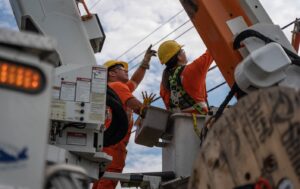|
Getting your Trinity Audio player ready...
|
Made-in-U.S. iPhones — In a bold move that could reshape global tech manufacturing, President Donald Trump has doubled down on his demand that Apple produce iPhones in the United States—or face 25% tariffs on imports. But analysts warn that reshoring iPhone production could send prices soaring—potentially tripling the cost of a new iPhone to $3,500
Posting on Truth Social, Trump declared:
Why Would U.S.-Made iPhones Be So Expensive?
Dan Ives, Wedbush Securities’ global tech strategist, calls Trump’s vision a “fictional tale”—and the numbers back him up:
✔ $30 Billion Cost – Moving just 10% of Apple’s supply chain to the U.S. would take three years and $30 billion.
✔ No Existing Infrastructure – Asia’s high-tech manufacturing ecosystem (factories, skilled labor, suppliers) can’t be replicated overnight.
✔ Labor & Logistics – U.S. wages are significantly higher, and building new fabrication plants (fabs) in states like West Virginia or New Jersey would be astronomically expensive.
“You build that supply chain in the U.S., they’ll be $3,500 iPhones,” Ives told CNN.
Apple’s China Reliance: Why Moving Production Is So Hard
Currently, 90% of iPhones are made in China, with key components sourced from:
🔹 Taiwan (semiconductors)
🔹 South Korea (display panels)
🔹 China (assembly & other parts)
This highly optimized supply chain keeps costs low—but also leaves Apple vulnerable to trade wars and tariffs.
Trump’s Tariff Threats: A $900 Million Problem
While smartphones were exempted from Trump’s steepest China tariffs, Apple still faces:
✔ 20% tariffs on some Chinese imports (due to fentanyl trade penalties)
✔ $900 million in added costs this quarter, per CEO Tim Cook
To mitigate risks, Apple is shifting some production to India—but a full U.S. move remains economically unfeasible.
Apple’s $500 Billion U.S. Investment: A Compromise?
In February, Apple announced a $500 billion U.S. expansion, including:
✅ New data centers & corporate facilities
✅ Server production in Texas (previously outsourced)
✅ More U.S.-based Apple TV+ production
However, this doesn’t include iPhone manufacturing—suggesting Apple is walking a tightrope between political pressure and economic reality.
What This Means for Consumers & Investors
1. Higher iPhone Prices Inevitable?
If Trump enforces stricter tariffs or domestic production mandates, Apple may have to:
➡ Absorb costs (hurting profits)
➡ Pass costs to consumers (making iPhones unaffordable for many)
2. Stock Market Jitters
Apple’s share price (AAPL) has dropped 14% since Trump’s latest tariff threats, reflecting investor anxiety over:
✔ Supply chain disruptions
✔ Potential profit margin squeeze
3. Global Tech War Escalation
Trump’s push is part of a broader U.S.-China decoupling, which could:
✔ Accelerate manufacturing shifts to India & Vietnam
✔ Strain relations with Taiwan & South Korea (key tech partners)
The Bottom Line: Is a U.S.-Made iPhone Possible?
While Trump’s “America First” manufacturing push resonates politically, experts agree:
🔴 $3,500 iPhones would devastate sales
🔴 Replicating Asia’s supply chain is nearly impossible
🔴 Apple’s compromises (like India production) may be the only realistic solution
This battle over tech manufacturing will only intensify. One thing’s clear: If iPhones do end up being made in America, consumers should brace for sticker shock.



